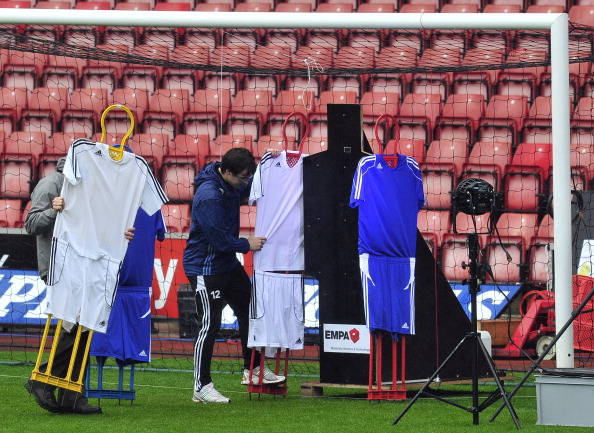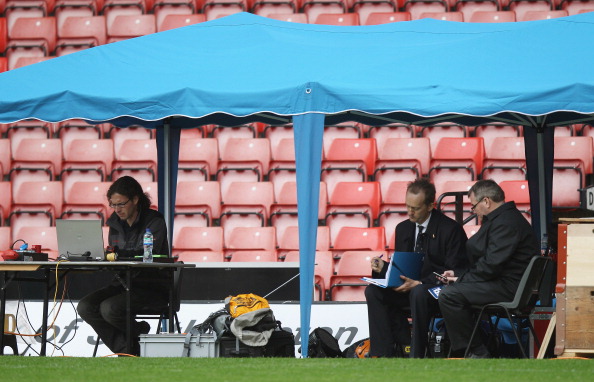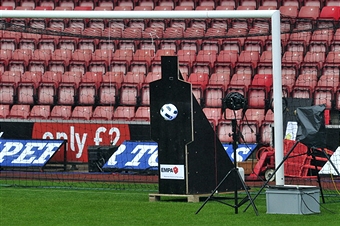By Andrew Warshaw at St Mary’s Stadium in Southampton
May 10 – After a string of false dawns and broken promises, the crucial final phase of testing for goal-line technology got under way today attended by a select panel of scientists and footballing lawmakers.
Six days before the first actual trial in match conditions is due to take place, the camera-based Hawk-Eye system was put through its paces here at the home of Southampton, recently promoted to the Premier League, on the English south coast.
Hawk-Eye is vying with the German-Danish product Goalref, which uses a magnetic field, for approval by the International Football Association Board (IFAB) at a potentially groundbreaking meeting in Kiev on July 2 with the prospect of goal-line technology being introduced a year later in time for the 2013-2014 season and the World Cup in Brazil.
Six other systems have already been deemed too inaccurate and although today’s gathering of experts looked pretty tame to the naked eye, with just a few hardy souls braving a heavy drizzle at one end of the pitch, the detailed procedure was a critical stage in the decision-making process.

A set of dummies simulating actual players were strategically moved along the goal-line as hundreds of balls were spewed out of a machine speeds of up to at 60 miles per hour, the whole process filmed by high-speed rooftop Hawk-Eye cameras and monitored by observers of the Swiss-based EMPA research laboratory which will ultimately pass its verdict to the IFAB after rigorous lab tests to see how the two systems fare in different climatic conditions.
The process continues on Friday, featuring real players, and Hawk-Eye will then be officially trialled in the Hampshire Senior Cup final at the same venue on May 16 between two lower-league sides.
Hawk-eye managing director Steve Carter, whose company has made its name in tennis and cricket, said football would be by far the biggest coup, with the results of goal-line incidents being transmitted to the referee’s watch within a maximum one second.
“It is tremendously exciting and it will be the highest profile and biggest sport that we do if we’re successful,” Carter said.
“All of the results are confidential. We don’t get to find out, but every indication is that everything is running very smoothly.”
Goal-line technology cannot come soon enough for fans, players and officials after a spate of recent if unintentional blunders in crucial games.

FIFA President Sepp Blatter, initially fiercely opposed, finally accepted the argument for some kind of scientific aid after Frank Lampard’s disallowed goal against Germany at the 2010 World Cup.
Neil Barry, the head of senior referees development at the Football Association and a key IFAB representative, said: “I haven’t come across a ref who’s not in favour.
“It’s not really a matter of opinion: there are a number of instances where sometimes referees need that technology to be sure.
“If it works then I think every referee would welcome goal-line technology.”
Goal-line technology has repeatedly been on the verge of implementation as an experiment, only to be ditched by the over-cautious IFAB.
But Barry said there had been “a total change in attitude and emphasis.”
“I’m pretty confident that if the tests are positive, when the board meets next on July 2 it will be agreed and licensed,” he added.
He also dismissed concerns, expressed by UEFA President Michel Platini among others, that the introduction of goal-line technology would act as a dangerous precedent for other areas of the game.
“The IFAB is a very conservative organisation and I would be astonished if we moved on to other forms of technology,” Barry said.
Contact the writer of this story at zib.l1751593445labto1751593445ofdlr1751593445owedi1751593445sni@w1751593445ahsra1751593445w.wer1751593445dna1751593445
Related stories
April 2012: Hawk-Eye goal-line technology faces official trial at minor league cup final
April 2012: Premier League chief pushes for goal-line technology after contentious FA Cup semi-final
April 2012: Goal-line technology to enter final testing phase following latest refereeing gaffe
March 2012: UEFA set to ignore goalline technology approval
March 2012: Goalline technology could be in place by end of 2012 after historic decision

